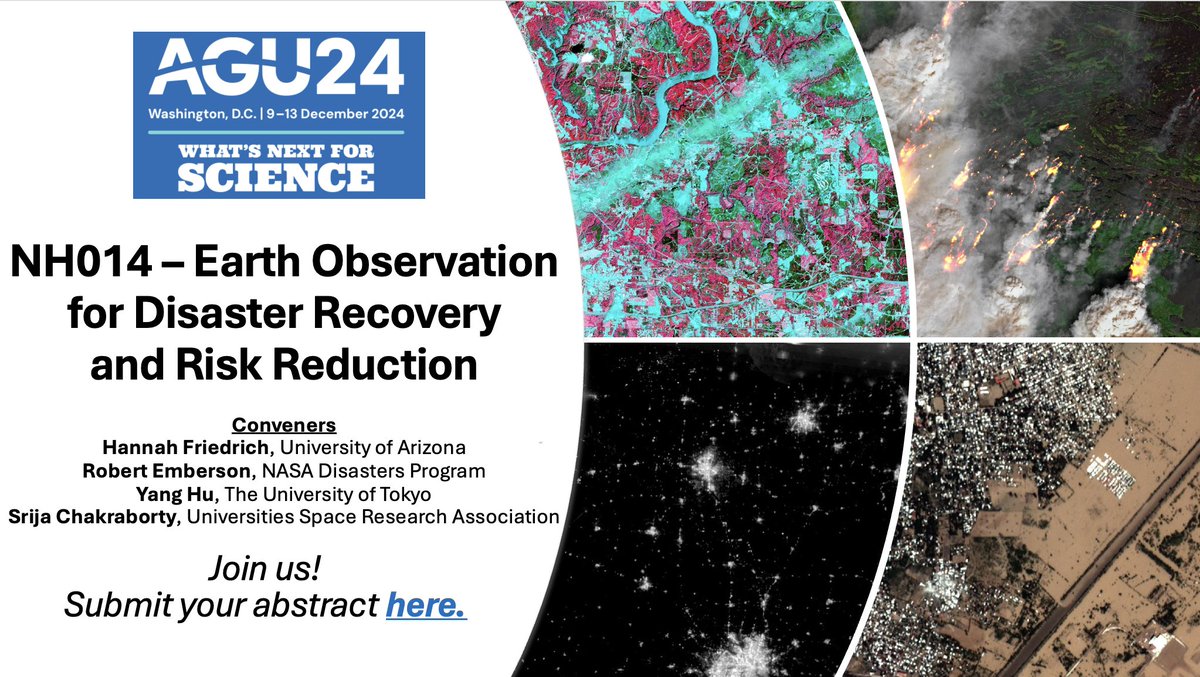
Hannah K. Friedrich
@hk_friedrich
Followers
376
Following
518
Statuses
111
PhD Student in Geography @sgde_uarizona. Satellite imagery and open data; human informal settlements; displacement and resettlement.
Joined November 2020
RT @H2OJusticeXCHG: Updated flyer for our upcoming Water Justice Knowledge Exchange event including including Cesar Lopez, the Director of…
0
3
0
Just a few days left to submit your abstract to the #AGU24 session "Earth Observation for Disaster Recovery and Risk Reduction," graced with invited abstracts by the @MirelaGTulbure and @sab_loos. Submit by July 31 at midnight ET!
0
3
8
Are you using satellite imagery to map how the built or natural world recovers from disasters or to inform disaster risk reduction? Submit your abstract to our session at @theAGU 2024 Annual Meeting! Apply here by July 31, 2024!
0
0
1
RT @Mzozane: The Vessel Project office was destroyed by a tornado that touched down in Lake Charles on yesterday 4/11/24. Some amazing peop…
0
70
0
New paper! WE KNOW floods disparately effect health outcomes across racial/ethnic and socioeconomic backgrounds. WE NEED validated flood metrics, baseline health data and community input on relevant health outcomes and mechanisms so assessments can drive impact + reduce disparity
New paper with @Dapper_Mapper, Yilei Yu, and @hk_friedrich! Our review highlights disparities in health outcomes following flood events in the US, but also provides methodological critiques to emphasize the need for precise flood exposure metrics and community engagement.
0
5
13
RT @queergeog: Will we avert geography's 'trans failure?' Check out my new commentary on @theAAG website. It will help you understand the i…
0
45
0
SO to my top-notch co-authors: @pazjusticiavida, @Dapper_Mapper, @alexsaunderstwt, A. A. Zuniga-Teran, L. A. Bakkensen, @m_cawley_, M. Dolk, R. A. Emberson, @sforrest1, @rockscatsbooks, @GyawaliNarayan1, @caitlynahall, A. J. Kettner, J. L. Sanchez Lozano, @GodeBola1 (7/7)
0
0
2
@SGDE_UArizona 5) Centering Co-Production in Research. Too often, ppl impacted by floods are excluded from research & decision making. This leads to misguided RQs that attempt to fill data gaps that aren’t necessary to fill. Impactful research = communities holding leadership in the process.
0
0
0
@SGDE_UArizona 4) Transboundary Flooding. Borders are fraught and dangerous constructs to begin with. Flood water doesn’t stop at borders, and neither should data or flood management decision-making.
0
0
0
@SGDE_UArizona 3) Unfair flood metrics. We need to change the metrics we use to assess what’s "worth" rebuilding and protecting against future floods. Factors like impacts on health, wellness, and cultural significance deserve a place among metrics used to assess what’s worth protecting.
0
0
0
@SGDE_UArizona 2) Risky development. Climate change gets the lion’s share of attn when assessing flood, but there’s also need to “follow the money” with development. By identifying what decisions increase some ppl’s flood risk and not others and WHY, we can identify ways to change that process.
0
0
0




